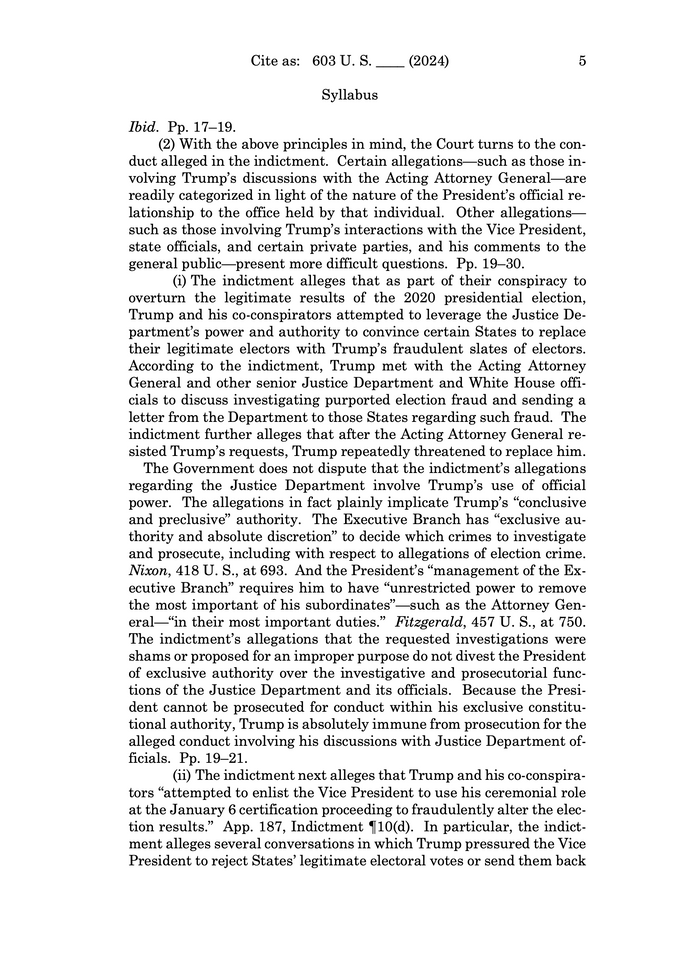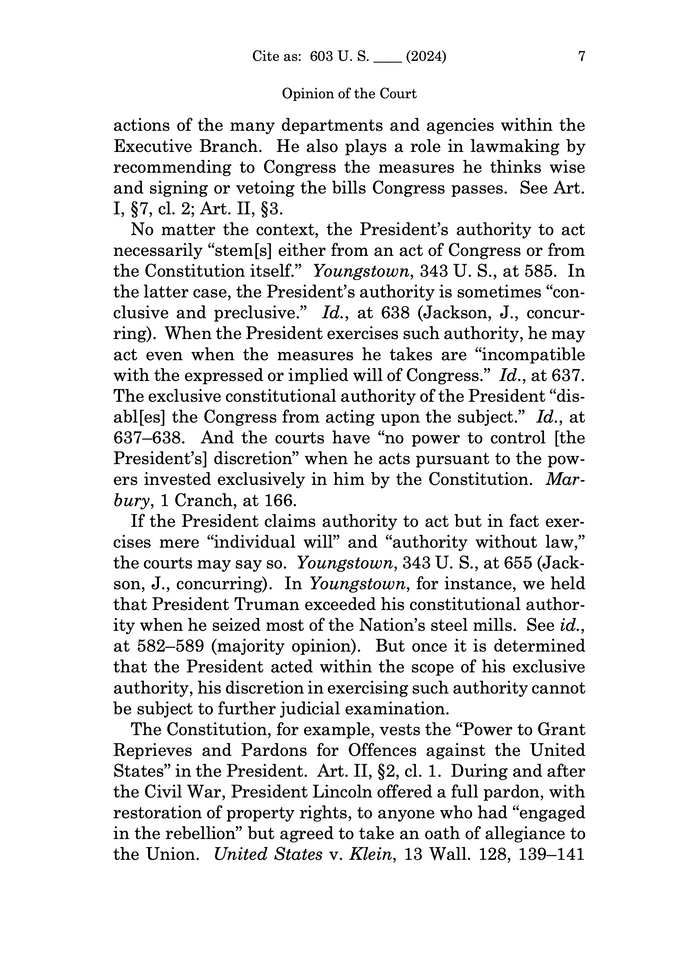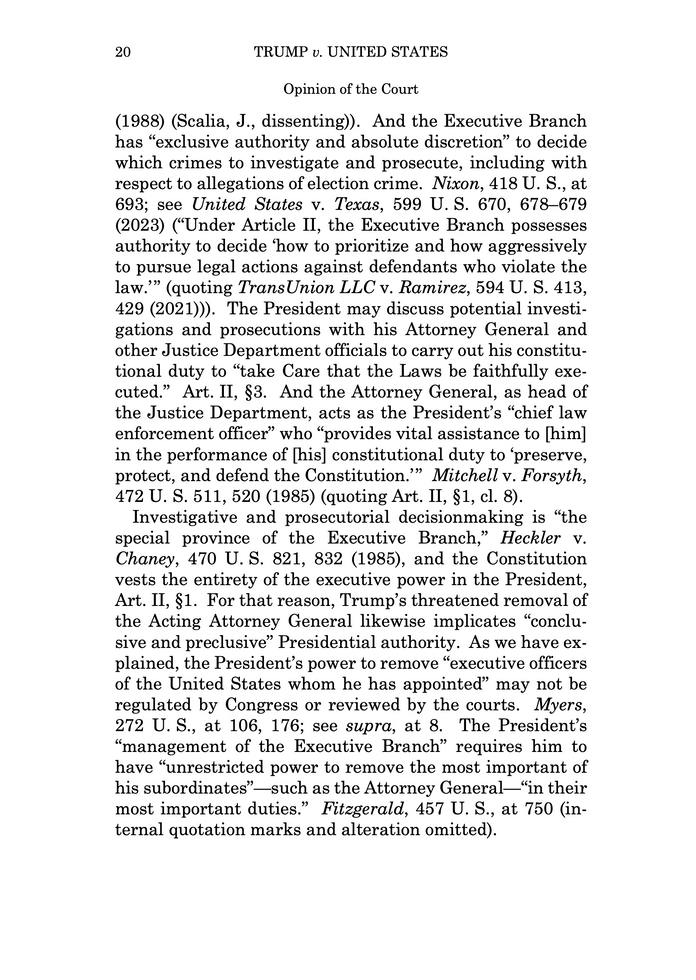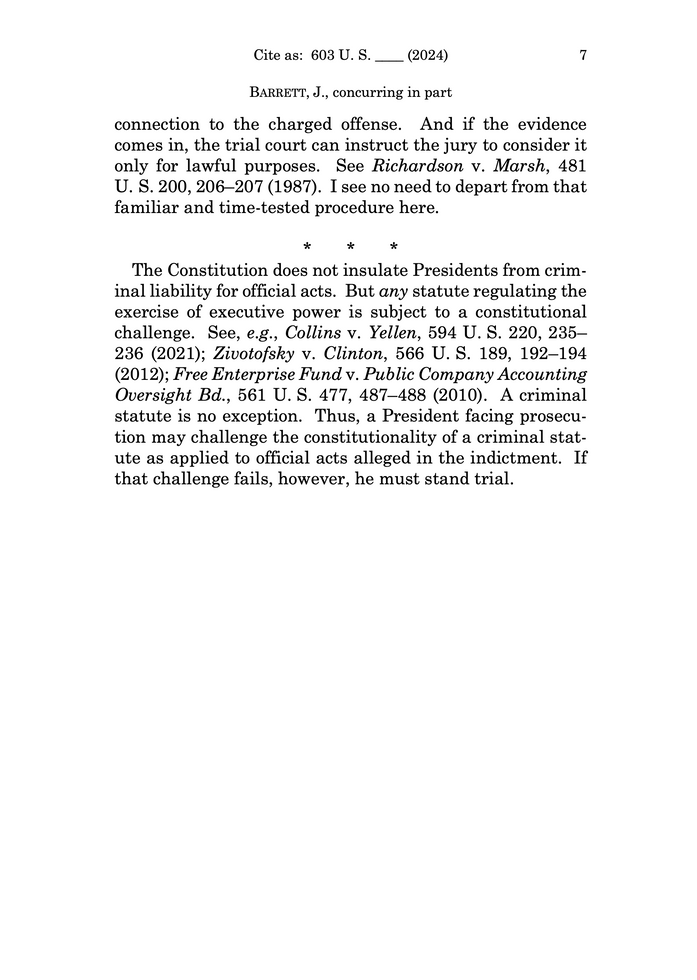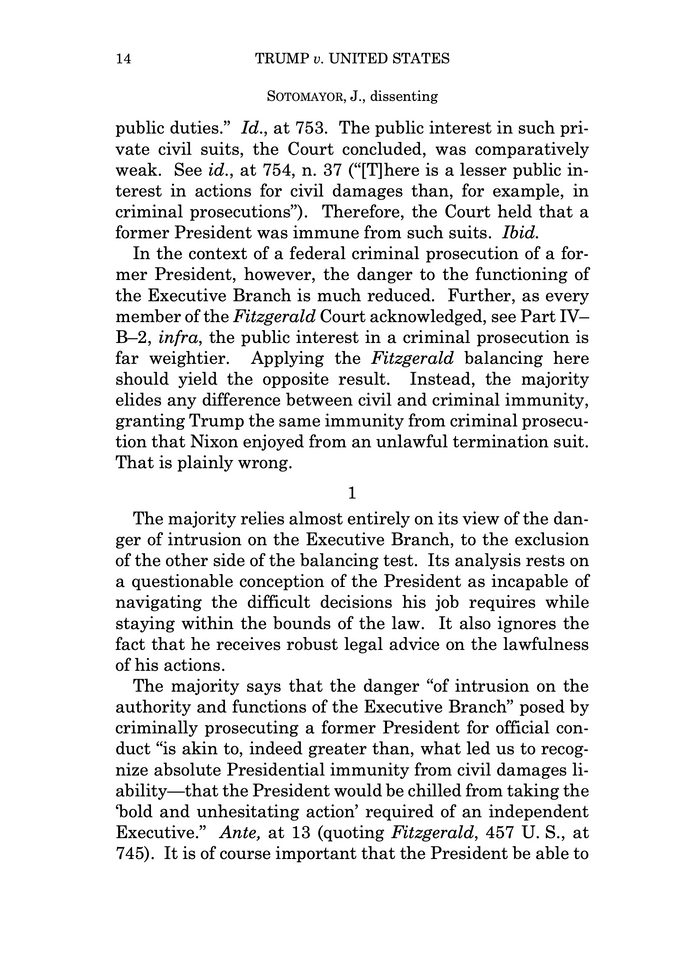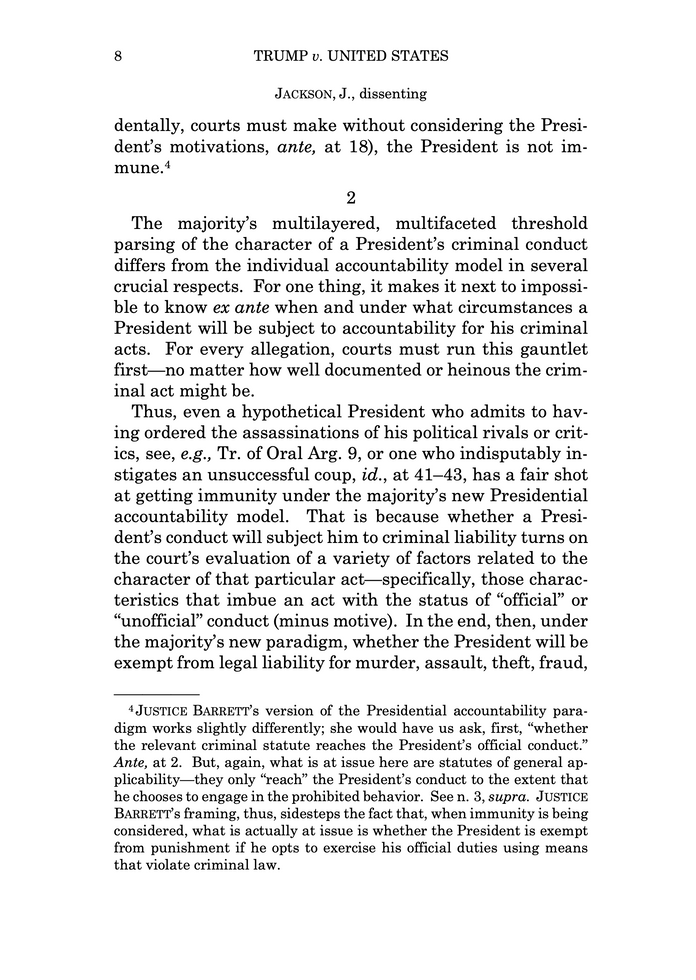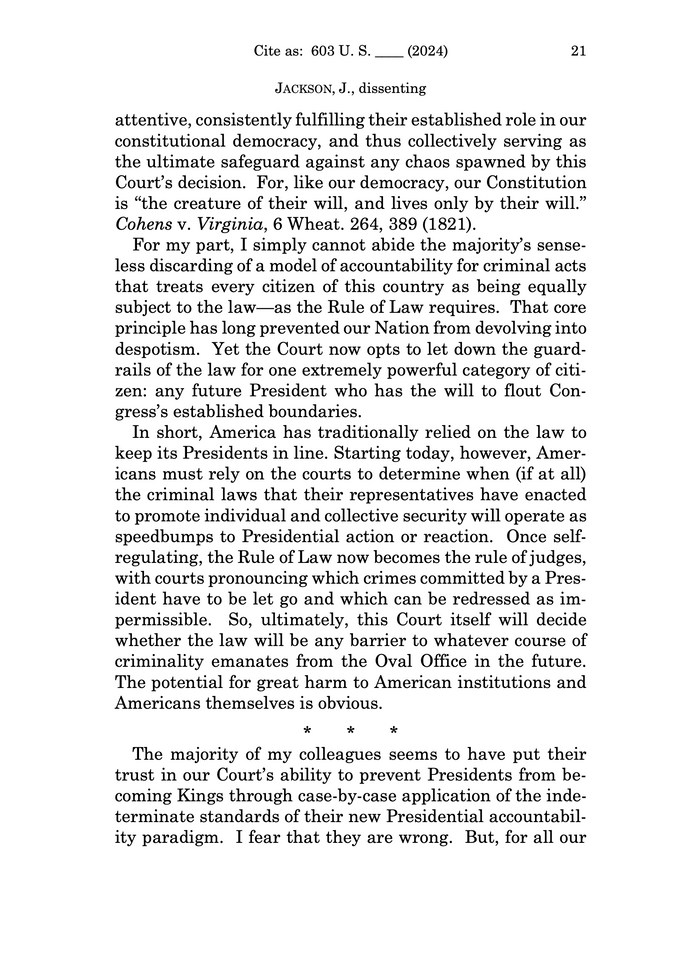The Nine Justices of the Supreme Court of the United States of America
The Crux of the Decision
In a landmark decision delivered on 1 July 2024, a divided US Supreme Court concluded by a 6-3 majority that:
“Under our constitutional structure of separated powers, the nature of Presidential power entitles a former President to absolute immunity from criminal prosecution for actions within his conclusive and preclusive constitutional authority. And he is entitled to at least presumptive immunity from prosecution for all his official acts. There is no immunity for unofficial acts.”
Chief Justice John Roberts wrote the decision for the majority, which comprised all 6 conservative members of the bench. The dissenting minority comprised all 3 liberal members of the bench.
How the Matter Arose
The Supreme Court proceeding resulted from a petition for certiorari lodged by former President Donald J Trump after a federal grand jury indicted him on four counts for conduct that occurred during his Presidency following the November 2020 election.
The indictment alleged that after losing that election, Trump conspired to overturn it by spreading knowingly false claims of election fraud to obstruct the collecting, counting, and certifying of the election results.
Trump moved to dismiss the indictment based on Presidential immunity, arguing that a President has absolute immunity from criminal prosecution for actions performed within the outer perimeter of his official responsibilities and that the indictment’s allegations fell within the core of his official duties. The District Court denied Trump’s motion to dismiss, holding that former Presidents do not possess federal criminal immunity for any acts. The DC Circuit affirmed the decision. Both the District Court and the DC Circuit declined to decide whether the indicted conduct involved official acts.
The Decision “Reshapes the Institution of the Presidency” - Justice Sotomayor
In making the decision, the Supreme Court majority acknowledged that:
“True, there is no “Presidential immunity clause” in the Constitution. But there is no “separation of powers clause” either... Yet that doctrine is undoubtedly carved into the Constitution’s text by its three articles separating powers and vesting the Executive power solely in the President.”
The justification given by the majority for the necessity of Presidential immunity was stated by Justice Roberts as follows:
“Potential criminal liability, and the peculiar public opprobrium that attaches to criminal proceedings, are plainly more likely to distort Presidential decision-making than the potential payment of civil damages.The hesitation to execute the duties of his office fearlessly and fairly that might result when a President is making decisions under “a pall of potential prosecution” … raises “unique risks to the effective functioning of government”.”
“Such an inquiry would risk exposing even the most obvious instances of official conduct to judicial examination on the mere allegation of improper purpose, thereby intruding on the Article II interests that immunity seeks to protect.”
“With Fear for Our Democracy, I Dissent” - Justice Sotomayor
Justice Sonia Sotomayor, with whom Justice Elena Kagan and Justice Ketanji Brown Jackson concurred, delivered the principal dissent.
The following quotes encapsulate the essence of the Court’s liberal minority’s dissent:
“Today’s decision to grant former Presidents criminal immunity reshapes the institution of the Presidency. It makes a mockery of the principle, foundational to our Constitution and system of Government, that no man is above the law.”
“In sum, the majority today endorses an expansive vision of Presidential immunity that was never recognised by the Founders, any sitting President, the Executive Branch, or even President Trump’s lawyers, until now. Settled understandings of the Constitution are of little use to the majority in this case, and so it ignores them. … In fact, the majority’s dividing line between “official” and “unofficial” conduct narrows the conduct considered “unofficial” almost to a nullity.”
“The President of the United States is the most powerful person in the country, and possibly the world. When he uses his official powers in any way, under the majority’s reasoning, he now will be insulated from criminal prosecution. Orders the Navy’s Seal Team 6 to assassinate a political rival? Immune. Organises a military coup to hold onto power? Immune. Takes a bribe in exchange for a pardon? Immune. Immune, immune, immune.”
“Let the President violate the law, let him exploit the trappings of his office for personal gain, let him use his official power for evil ends. Because if he knew that he may one day face liability for breaking the law, he might not be as bold and fearless as we would like him to be. That is the majority’s message today.”
“Even if these nightmare scenarios never play out, and I pray they never do, the damage has been done. The relationship between the President and the people he serves has shifted irrevocably. In every use of official power, the President is now a king above the law.”
Justice Sotomayor concluded her reasons for dissenting as follows:
“Never in the history of our Republic has a President had reason to believe that he would be immune from criminal prosecution if he used the trappings of his office to violate the criminal law. Moving forward, however, all former Presidents will be cloaked in such immunity. If the occupant of that office misuses official power for personal gain, the criminal law that the rest of us must abide will not provide a backstop. With fear for our democracy, I dissent.”
“Rhetorically Chilling” but “Wholly Unjustified” Contentions - Justice Roberts
Writing on behalf of the majority, Justice Roberts was dismissive of the minority’s concerns as empty rhetoric and “fear mongering on the basis of extreme hypotheticals about a future where the President “feels empowered to violate federal criminal law””.
He emphasised that:
“The dissents overlook the more likely prospect of an Executive Branch that cannibalises itself, with each successive President free to prosecute his predecessors, yet unable to boldly and fearlessly carry out his duties for fear that he may be next... Virtually every President is criticised for insufficiently enforcing some aspect of federal law (such as drug, gun, immigration, or environmental laws). An enterprising prosecutor in a new administration may assert that a previous President violated that broad statute. Without immunity, such types of prosecutions of ex-Presidents could quickly become routine. The enfeebling of the Presidency and our Government that would result from such a cycle of factional strife is exactly what the Framers intended to avoid. Ignoring those risks, the dissents are instead content to leave the preservation of our system of separated powers up to the good faith of prosecutors.”
Some notable points of criticism of the minority’s decision raised by Justice Roberts are cited below:
“Unable to muster any meaningful textual or historical support, the principal dissent suggests that there is an “established understanding” that “former Presidents are answerable to the criminal law for their official acts.””
“Conspicuously absent is mention of the fact that since the founding, no President has ever faced criminal charges—let alone for his conduct in office. And accordingly no court has ever been faced with the question of a President’s immunity from prosecution. All that our Nation’s practice establishes on the subject is silence.
Coming up short on reasoning, the dissents repeatedly level variations of the accusation that the Court has rendered the President “above the law”... As before, that “rhetorically chilling” contention is “wholly unjustified.””
Developments Following the Supreme Court’s Decision
The Supreme Court thus vacated the judgment of the Court of Appeals for the DC Circuit and remanded the case for further proceedings in the District Court “consistent with [its] opinion”.
Essentially, the Supreme Court directed the District Court to first determine issues concerning the availability of Presidential immunity by determining whether the acts that form the basis of the alleged crimes were undertaken by Trump in an official capacity. Only if the District Court determined that the acts were not undertaken by Trump in an official capacity would the prosecution be at liberty to proceed with the charges. Moreover, the determination of the District Court in this respect would be open to the normal appeal process, creating the possibility of further intervention by the Supreme Court.
On August 27, 2024, Jack Smith, the special counsel prosecuting Trump, filed a revised indictment in the District Court to account for the Supreme Court’s decision.
However, on November 25, 2024, following Trump’s re-election for a second Presidential term, Smith announced that the Justice Department was discontinuing the prosecution owing to its longstanding policy of not prosecuting a sitting President.
Further Information
The complete judgment of the Supreme Court is available here:
A playlist containing videos that capture incisive analysis of the Supreme Court’s decision (including the brilliant critique by Ms Kate Shaw (Professor, Carey School of Law, University of Pennsylvania)) and further developments in the matter (including Smith’s ultimate discontinuation of the case) is available below.

















